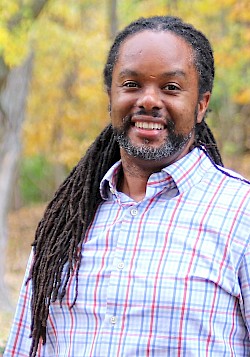CHRISTOPHER CARTER, ASSOCIATE PROFESSOR OF THEOLOGY, ECOLOGY AND RACE
A significant voice on food justice
 As a boy, Christopher Carter would visit his grandparents in Three Rivers, Michigan, each summer. After morning chores, he was free to explore the town’s woods and streams with his cousins and friends. In the evenings, he would learn about grandparents’ personal histories.
As a boy, Christopher Carter would visit his grandparents in Three Rivers, Michigan, each summer. After morning chores, he was free to explore the town’s woods and streams with his cousins and friends. In the evenings, he would learn about grandparents’ personal histories.
Reflecting today, he sees how those days were shaping him for his work as a significant voice in the theological space where racial justice, ecology and food justice intersect.
This fall, Carter was elected to the MTSO faculty as associate professor of theology, ecology and race. He is teaching remotely from Los Angeles, where he serves as a United Methodist pastor and lives with his wife, Gabrielle, and their son, Isaiah. He comes to campus for significant events throughout the year.
Carter’s grandparents were raised in Mississippi. “My grandfather would say, ‘Hey, this is just life: If you want to have some stability, you have to work harder than white people.’”
“It wasn’t until I got into undergrad and graduate school that I began to connect the environmental justice,” Carter said. The connection reached back to the joy of youthful summers outdoors in Michigan. “What’s so profound is that I didn’t have the words to express what I felt. I wouldn’t have called it environmental justice or stewardship. I just called it playing outside.”
After high school, Carter got a job and volunteered in his Methodist church. It took some prodding by his then-fiancée, Gabrielle, who “saw in me something I couldn’t see in myself,” to convince him to give college a try. After getting average grades in high school, he excelled in college and beyond. He graduated from Cornerstone University with a bachelor’s degree in business administration before earning a Master of Divinity and Ph.D. from Claremont School of Theology.
Grad school helped Carter see how his interest in the environment and commitment to racial justice were connected: “I started to see how people of color were victims of environmental injustice – how we were more likely to live near environmental polluting plants, how we had less access to clean water.”
He was a doctoral student when the third component of his work came into focus. In November 2011, he was driving north on Interstate 5 toward San Francisco for the American Academy of Religion (AAR) Annual Meeting.
“When you drive that way, you see all the factory farms,” he said. “I see all these people working in these fields, and it looks terrible. And it’s all brown people. I could feel their suffering. And then it’s like this bolt of lightning: It’s just like your grandpa.”
Carter recalled how, during trips to Mississippi for family reunions, his grandfather would point out the fields where he had worked. “When I was able to connect the suffering of those migrant workers with the suffering of my grandfather, it just became really personal for me.”
As he considered the toll food production takes on farm workers and animals, he began asking, “How can I eat in a way that doesn’t harm others? How can I eat in a way that’s in alignment with my morals and my values?” He addresses that question and others, along with providing well-received vegan recipes, in his 2021 book, The Spirit of Soul Food: Race, Faith, and Food Justice.
In 2014, Carter met MTSO President Jay Rundell at an AAR meeting, and the two discussed food justice and MTSO’s Seminary Hill Farm. So began a relationship that has culminated with Carter’s appointment to the faculty. He comes to MTSO from the University of San Diego, where he was an associate professor in the Department of Theology and Religious Studies.
“My meeting with Dr. Carter at AAR coincided with a growing awareness of the connections between theology, ecology and race,” Rundell said. “For years, we have hoped the day would come when we could welcome him to our faculty, and we’re happy to do so now.”
Carter shares his enthusiasm: “When I came out here to visit the first time, I thought, man, everything I want to do with food is right on this campus. I am in the place that God has called me.”
Methodist Theological School in Ohio provides theological education and leadership in pursuit of a just, sustainable and generative world. In addition to the Master of Divinity degree, the school offers master’s degrees in public theology, social justice and theological studies, along with a Doctor of Ministry degree.
CONTACT:
Danny Russell, communications director
drussell@mtso.edu, 740-362-3322